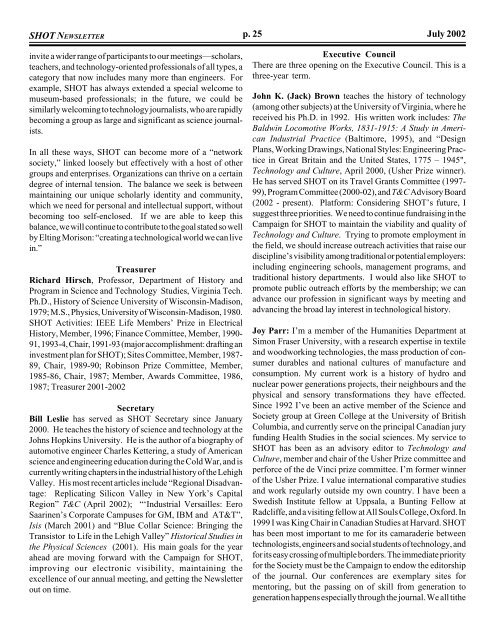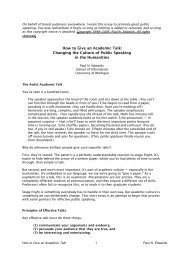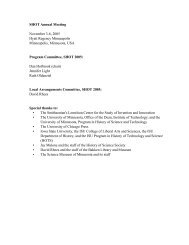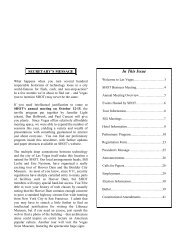NEWSLETTER - Society for the History of Technology
NEWSLETTER - Society for the History of Technology
NEWSLETTER - Society for the History of Technology
You also want an ePaper? Increase the reach of your titles
YUMPU automatically turns print PDFs into web optimized ePapers that Google loves.
SHOT <strong>NEWSLETTER</strong><br />
invite a wider range <strong>of</strong> participants to our meetings—scholars,<br />
teachers, and technology-oriented pr<strong>of</strong>essionals <strong>of</strong> all types, a<br />
category that now includes many more than engineers. For<br />
example, SHOT has always extended a special welcome to<br />
museum-based pr<strong>of</strong>essionals; in <strong>the</strong> future, we could be<br />
similarly welcoming to technology journalists, who are rapidly<br />
becoming a group as large and significant as science journalists.<br />
In all <strong>the</strong>se ways, SHOT can become more <strong>of</strong> a “network<br />
society,” linked loosely but effectively with a host <strong>of</strong> o<strong>the</strong>r<br />
groups and enterprises. Organizations can thrive on a certain<br />
degree <strong>of</strong> internal tension. The balance we seek is between<br />
maintaining our unique scholarly identity and community,<br />
which we need <strong>for</strong> personal and intellectual support, without<br />
becoming too self-enclosed. If we are able to keep this<br />
balance, we will continue to contribute to <strong>the</strong> goal stated so well<br />
by Elting Morison: “creating a technological world we can live<br />
in.”<br />
Treasurer<br />
Richard Hirsch, Pr<strong>of</strong>essor, Department <strong>of</strong> <strong>History</strong> and<br />
Program in Science and <strong>Technology</strong> Studies, Virginia Tech.<br />
Ph.D., <strong>History</strong> <strong>of</strong> Science University <strong>of</strong> Wisconsin-Madison,<br />
1979; M.S., Physics, University <strong>of</strong> Wisconsin-Madison, 1980.<br />
SHOT Activities: IEEE Life Members’ Prize in Electrical<br />
<strong>History</strong>, Member, 1996; Finance Committee, Member, 1990-<br />
91, 1993-4, Chair, 1991-93 (major accomplishment: drafting an<br />
investment plan <strong>for</strong> SHOT); Sites Committee, Member, 1987-<br />
89, Chair, 1989-90; Robinson Prize Committee, Member,<br />
1985-86, Chair, 1987; Member, Awards Committee, 1986,<br />
1987; Treasurer 2001-2002<br />
Secretary<br />
Bill Leslie has served as SHOT Secretary since January<br />
2000. He teaches <strong>the</strong> history <strong>of</strong> science and technology at <strong>the</strong><br />
Johns Hopkins University. He is <strong>the</strong> author <strong>of</strong> a biography <strong>of</strong><br />
automotive engineer Charles Kettering, a study <strong>of</strong> American<br />
science and engineering education during <strong>the</strong> Cold War, and is<br />
currently writing chapters in <strong>the</strong> industrial history <strong>of</strong> <strong>the</strong> Lehigh<br />
Valley. His most recent articles include “Regional Disadvantage:<br />
Replicating Silicon Valley in New York’s Capital<br />
Region” T&C (April 2002); “‘Industrial Versailles: Eero<br />
Saarinen’s Corporate Campuses <strong>for</strong> GM, IBM and AT&T”,<br />
Isis (March 2001) and “Blue Collar Science: Bringing <strong>the</strong><br />
Transistor to Life in <strong>the</strong> Lehigh Valley” Historical Studies in<br />
<strong>the</strong> Physical Sciences (2001). His main goals <strong>for</strong> <strong>the</strong> year<br />
ahead are moving <strong>for</strong>ward with <strong>the</strong> Campaign <strong>for</strong> SHOT,<br />
improving our electronic visibility, maintaining <strong>the</strong><br />
excellence <strong>of</strong> our annual meeting, and getting <strong>the</strong> Newsletter<br />
out on time.<br />
p. 25<br />
July 2002<br />
Executive Council<br />
There are three opening on <strong>the</strong> Executive Council. This is a<br />
three-year term.<br />
John K. (Jack) Brown teaches <strong>the</strong> history <strong>of</strong> technology<br />
(among o<strong>the</strong>r subjects) at <strong>the</strong> University <strong>of</strong> Virginia, where he<br />
received his Ph.D. in 1992. His written work includes: The<br />
Baldwin Locomotive Works, 1831-1915: A Study in American<br />
Industrial Practice (Baltimore, 1995), and “Design<br />
Plans, Working Drawings, National Styles: Engineering Practice<br />
in Great Britain and <strong>the</strong> United States, 1775 – 1945",<br />
<strong>Technology</strong> and Culture, April 2000, (Usher Prize winner).<br />
He has served SHOT on its Travel Grants Committee (1997-<br />
99), Program Committee (2000-02), and T&C Advisory Board<br />
(2002 - present). Plat<strong>for</strong>m: Considering SHOT’s future, I<br />
suggest three priorities. We need to continue fundraising in <strong>the</strong><br />
Campaign <strong>for</strong> SHOT to maintain <strong>the</strong> viability and quality <strong>of</strong><br />
<strong>Technology</strong> and Culture. Trying to promote employment in<br />
<strong>the</strong> field, we should increase outreach activities that raise our<br />
discipline’s visibility among traditional or potential employers:<br />
including engineering schools, management programs, and<br />
traditional history departments. I would also like SHOT to<br />
promote public outreach ef<strong>for</strong>ts by <strong>the</strong> membership; we can<br />
advance our pr<strong>of</strong>ession in significant ways by meeting and<br />
advancing <strong>the</strong> broad lay interest in technological history.<br />
Joy Parr: I’m a member <strong>of</strong> <strong>the</strong> Humanities Department at<br />
Simon Fraser University, with a research expertise in textile<br />
and woodworking technologies, <strong>the</strong> mass production <strong>of</strong> consumer<br />
durables and national cultures <strong>of</strong> manufacture and<br />
consumption. My current work is a history <strong>of</strong> hydro and<br />
nuclear power generations projects, <strong>the</strong>ir neighbours and <strong>the</strong><br />
physical and sensory trans<strong>for</strong>mations <strong>the</strong>y have effected.<br />
Since 1992 I’ve been an active member <strong>of</strong> <strong>the</strong> Science and<br />
<strong>Society</strong> group at Green College at <strong>the</strong> University <strong>of</strong> British<br />
Columbia, and currently serve on <strong>the</strong> principal Canadian jury<br />
funding Health Studies in <strong>the</strong> social sciences. My service to<br />
SHOT has been as an advisory editor to <strong>Technology</strong> and<br />
Culture, member and chair <strong>of</strong> <strong>the</strong> Usher Prize committee and<br />
per<strong>for</strong>ce <strong>of</strong> <strong>the</strong> de Vinci prize committee. I’m <strong>for</strong>mer winner<br />
<strong>of</strong> <strong>the</strong> Usher Prize. I value international comparative studies<br />
and work regularly outside my own country. I have been a<br />
Swedish Institute fellow at Uppsala, a Bunting Fellow at<br />
Radcliffe, and a visiting fellow at All Souls College, Ox<strong>for</strong>d. In<br />
1999 I was King Chair in Canadian Studies at Harvard. SHOT<br />
has been most important to me <strong>for</strong> its camaraderie between<br />
technologists, engineers and social students <strong>of</strong> technology, and<br />
<strong>for</strong> its easy crossing <strong>of</strong> multiple borders. The immediate priority<br />
<strong>for</strong> <strong>the</strong> <strong>Society</strong> must be <strong>the</strong> Campaign to endow <strong>the</strong> editorship<br />
<strong>of</strong> <strong>the</strong> journal. Our conferences are exemplary sites <strong>for</strong><br />
mentoring, but <strong>the</strong> passing on <strong>of</strong> skill from generation to<br />
generation happens especially through <strong>the</strong> journal. We all ti<strong>the</strong>





